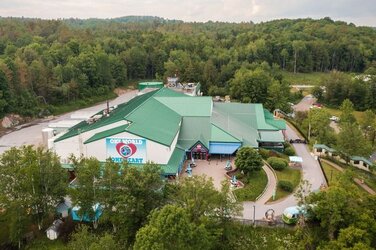
Ben & Jerry’s founders Ben Cohen and Jerry Greenfield, in a black shirt, say the brand is now at a crossroads.
By Saabira Chaudhuri | Photographs by Oliver Parini for WSJ
June 26, 2024 5:30 am ET
Ben Cohen and Jerry Greenfield are about as well known for their progressive politics as they are for quirky ice cream flavors like Chunky Monkey and Phish Food.
Their experiment in melding business with social justice for years seemed like a model to which many in the corporate world were warming up. And then attitudes cooled.
Some businesses have started to put less emphasis on the kinds of social and political issues that Ben & Jerry’s has championed. Certain investors have urged corporations to stick with what they know best.
For their part, the lifelong friends, both now 73 years old, say their style of corporate activism isn’t bad for business—just the opposite.
Most companies aren’t comfortable engaging with social issues because “they don’t want to potentially alienate customers,” says Greenfield. “The irony is for Ben & Jerry’s, that is what makes the company successful.”
Cohen and Greenfield say the brand is now at a crossroads after parent company Unilever said in March that it would spin off or sell its ice cream division, a move interpreted by some as the culmination of a failed experiment in mixing progressive politics with big business.
While Ben & Jerry’s has for decades worn its heart on its sleeve, some of the brand’s political pronouncements in recent years have angered certain consumers and investors. Cohen believes this is at least partly the reason for its owner’s decision to part ways. For Unilever, “Ben & Jerry’s creates a lot of problems,” he says.

Climate change has been one of the issues on which Ben & Jerry’s has long focused.
Cohen and Greenfield, who still count as Unilever employees, say the upset is worth it.
The founders shared internal sales data with The Wall Street Journal that showed the brand had logged stronger sales growth than its parent’s broader ice cream business in three of the past five years. Neither side disclosed profit figures.
Unilever’s ice cream head, Peter ter Kulve, says that, “whilst we don’t always agree” with Ben & Jerry’s, the combination of the company’s leadership, the brand’s board and founders’ involvement has been successful.
Do Cohen and Greenfield think the brand could be better off with a new owner? “To have a values-aligned owner of Ben & Jerry’s would be a beautiful thing,” says Cohen.
Of all the multinationals that could have bought Ben & Jerry’s, Unilever—given its historic focus on sustainability—was seen as perhaps the best fit. But in recent years, a marketing strategy aimed at imbuing all of Unilever’s brands with a social or environmental purpose fell flat. Unilever has since narrowed the strategy to a few big brands.
Both men earned millions from Unilever’s $326 million purchase of their ice cream brand and say the deal hasn’t been all bad. Unilever helped Ben & Jerry’s expand internationally—it is now sold in 43 countries—and figure out the nuts and bolts of building new factories. It also gave the brand a bigger platform to push its social mission, albeit less aggressively than the founders would have liked.
In recent years, a handful of prominent brands have been hit by consumer boycotts after wading into the culture wars. Companies are also being presented with more investor proposals against environmental and social initiatives while some activists are taking companies to court over their diversity and inclusion pledges. The upshot is that companies, particularly in the U.S., are talking less about their ESG efforts.
Cohen and Greenfield say they understand the pressure public companies—including Unilever—are under to avoid thorny issues but think this limits their growth prospects. Consumers, particularly younger ones, expect brands to speak out about issues like war, racism and climate change, they say.

Social activism became a part of Ben & Jerry’s identity early on, alongside whimsically named flavors. PHOTO: TOBY TALBOT/ASSOCIATED PRESS
Frosty relations
Ben & Jerry’s began in 1978, when Cohen and Greenfield started selling ice cream out of a gas station in Burlington, Vt. They threw chunks of candy and nuts into partially frozen smooth ice cream largely because the heavily textured result appealed to Cohen, whose poor sense of smell impedes his ability to taste.Alongside whimsically named flavors, social activism became a part of the brand’s identity early on. In 1988, Cohen and Greenfield launched Peace Pops, a chocolate-covered ice cream on a stick that advocated for cuts to U.S. military spending.
By the 90s, the brand had become one of America’s most recognizable brands, later that decade attracting takeover interest. Cohen and Greenfield say they didn’t want to sell but, as a public company, had to put Unilever’s offer to shareholders.
To keep the founders happy, Unilever agreed to let Ben & Jerry’s retain an independent board that would dictate the company’s social mission.
Despite this, “the first few years were rough,” remembers Cohen.
Unilever cut costs, making pints with less butterfat and using smaller, cheaper chunks. A proposed new flavor intended to celebrate Vermont’s law legalizing civil unions for same-sex couples was scrapped.
Over the years, “the social mission rose or fell based on who the CEO was,” says Cohen. “If the CEO was into it, it prospered and if the CEO wasn’t it didn’t.”

Ben & Jerry’s publicly opposed Donald Trump by launching a flavor called Pecan Resist. PHOTO: JOY ASICO/AP IMAGES FOR BEN & JERRY’S

Ben Cohen and Jerry Greenfield say consumers expect brands to speak out about social issues. PHOTO: CHIP SOMODEVILLA/GETTY IMAGES
Unilever preferred to attach its brands to more neutral causes, like reducing food waste or improving sanitation. Ben & Jerry’s, by contrast, publicly opposed what it described as Donald Trump’s “regressive agenda” by launching a flavor called Pecan Resist. It accused President Biden on social media of fanning the flames of war by sending troops to Europe after Russia’s invasion of Ukraine.
Tensions between the brand and its parent burst into public view soon after Ben & Jerry’s said it would halt sales in Jewish settlements in the Israeli-occupied West Bank and contested East Jerusalem in July 2021. It said selling in those settlements, considered illegal by much of the international community, was inconsistent with its values.
The move prompted some consumers to boycott Unilever’s brands, and U.S. pension funds to sell shares in the company.
Unilever tried to quell the furor by selling Ben & Jerry’s business in Israel without its permission. The brand then sued its parent, saying it had violated the acquisition agreement. The two sides eventually settled, but tensions persist.
“There is no other entity like Ben & Jerry’s at Unilever,” says Cohen. “They don’t understand it, they don’t really know how to deal with it and they want to run it like any other brand that they own.”
In January, Unilever prevented Ben & Jerry’s from calling for a cease-fire in Gaza, the founders say. The brand circumvented its parent by issuing a statement via its independent board.
How involved Cohen and Greenfield remain depends on to what extent any new owner permits the brand’s board to continue to pursue its social mission.
If bought by a finance-focused entity, Ben & Jerry’s will suffer, Cohen says. “They don’t realize the intangibles that are behind the numbers.”

The Ben & Jerry’s factory in Waterbury, Vt.

The founders say Ben & Jerry’s sales have grown at a 7% compound annual growth rate between its acquisition in 2000 and last year.
Still eating ice cream
Born four days apart, Cohen and Greenfield have been best friends since seventh grade.They live 2 miles from each other near Ben & Jerry’s headquarters in Vermont, and hang out regularly. “It’s more fun to do things together,” says Greenfield.
The pair have dabbled in various construction projects together, building a gazebo, cabin and bench in their free time. “It’s much more beautiful than your usual park bench,” qualifies Cohen. “We didn’t buy any lumber, we just cut down trees.”
They also get together to do physical-therapy exercises to help their bad backs but dislike the dead bug, which involves lying on your back and raising and lowering opposite arms and legs.
Both men have remained involved with Ben & Jerry’s and get a salary from Unilever although they have no managerial or operational role at the company. They show up to franchisee meetings, scoop-shop openings and employee training sessions to shake hands and offer encouragement.
They see their main role as bringing visibility to causes the Ben & Jerry’s brand supports. They are currently lobbying to end qualified immunity, the controversial doctrine that says police officers and other officials can’t be sued for misconduct unless they have violated “clearly established” rights.

The ‘flavor graveyard’ outside the Ben & Jerry’s factory in Waterbury, Vt.
Recently, Unilever’s new chief executive, Hein Schumacher, visited Vermont, where he met the founders. Cohen describes him as a “nice guy” but says they didn’t spend a lot of time together. “I assume he’s a very good executive,” he says. “Business executive.”
The pair’s favorite flavors—Coconut Almond Fudge Chip for Greenfield and Mocha Walnut for Cohen—have long since hit “the flavor graveyard.” The coconut flavor wasn’t selling well enough while the mocha one drew lots of consumer complaints. “Half of them would say it had too much chocolate in it and the other half would say it had too much coffee,” says Cohen.
How worried are the founders that in an era of weight-loss drugs people could eat less ice cream?
Not at all, they say. Greenfield says people’s relationship with ice cream is about enjoyment or celebration, not nutrition. Still, people should eat ice cream in moderation. “You’re not supposed to eat a whole tub at once,” he says primly.
“I think you can eat a whole tub at once,” interjects Cohen. “You’re just not supposed to do it every day.”

Ben Cohen and Jerry Greenfield live 2 miles from each other near Ben & Jerry’s headquarters in Vermont.
Source (Archive)